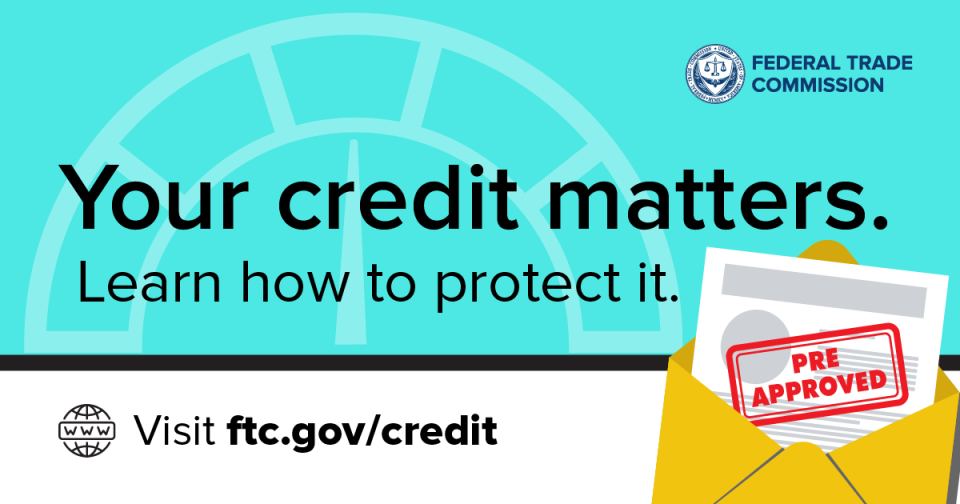If you’re shopping for a credit card or loan, the only words sweeter than “You’re approved!” may be, “You’re pre-approved!” But according to the FTC, many people who got “pre-approved” credit offers from Credit Karma weren’t approved for credit and, as a result, wasted time applying and saw their credit scores drop when their applications were denied.
An FTC lawsuit alleges that Credit Karma deceived people by claiming — falsely — that they had been “pre-approved” or had “90% odds” of approval for credit cards or loans offered by banks and lenders that used Credit Karma to promote their financial products.
Under a settlement, Credit Karma will pay $3 million to reimburse people who responded to its allegedly deceptive offers but were ultimately denied credit. The order also prohibits Credit Karma from making misleading claims that people have been or are likely to be approved for credit or loans.
Credit Karma touts online access to credit information and tools. To join, people must give Credit Karma personal information and agree to let it collect financial and other information about them. Credit Karma recommends financial products to its users and is paid by the financial product companies when users get their products.
According to the FTC, Credit Karma sent its users recommendations in the form of deceptive “pre-approved” credit offers from at least February 2018 through April 2021, knowing that users were more likely to respond if they believed their applications would be accepted. But, the FTC says, for many of the supposed offers, nearly a third of the people who applied were rejected by the companies whose product Credit Karma recommended, based on disqualifying financial characteristics, like bankruptcies.
What’s more, the FTC says, the companies’ reviews showed up as hard inquiries on the rejected applicants’ credit reports. A “hard inquiry” indicates that you have applied for credit and can lower your credit score. People also wasted significant time applying for credit cards they weren’t eligible to get, the FTC says.
Concerned about your credit? There are ways to monitor and protect it without giving away your personal information. Understanding Your Credit has the details.


It is your choice whether to submit a comment. If you do, you must create a user name, or we will not post your comment. The Federal Trade Commission Act authorizes this information collection for purposes of managing online comments. Comments and user names are part of the Federal Trade Commission’s (FTC) public records system, and user names also are part of the FTC’s computer user records system. We may routinely use these records as described in the FTC’s Privacy Act system notices. For more information on how the FTC handles information that we collect, please read our privacy policy.
The purpose of this blog and its comments section is to inform readers about Federal Trade Commission activity, and share information to help them avoid, report, and recover from fraud, scams, and bad business practices. Your thoughts, ideas, and concerns are welcome, and we encourage comments. But keep in mind, this is a moderated blog. We review all comments before they are posted, and we won’t post comments that don’t comply with our commenting policy. We expect commenters to treat each other and the blog writers with respect.
We don't edit comments to remove objectionable content, so please ensure that your comment contains none of the above. The comments posted on this blog become part of the public domain. To protect your privacy and the privacy of other people, please do not include personal information. Opinions in comments that appear in this blog belong to the individuals who expressed them. They do not belong to or represent views of the Federal Trade Commission.
I have been targeted by Credit Karma every single day and definitely in 2021 I was denied on many credit card application with hard credit inquiries causing further damage to my credit. And Credit Karma is still up until today sending me emails about applying for credit card and personal loans.
That has happened to me several times
Constantly get offers and am so sick of it.
They still do it!
They are still doing this as of 10/14/22. I just applied for a pre approved loan was denied. Then they sent me an email on 10/28/22 saying because I was denied I could pick to open a spend account with credit karma and they would put $50 in or $50 Amazon gift card. I picked the Amazon card. It is 11/8/22 haven’t seen it yet.
Where do I send up. I did this 3 times and denied all 3 times. They send me emails for pre-approval with high chances and all denials
I was affected by this. I applied for many loans I never received.
Will I be able to collect damages?
Pagination